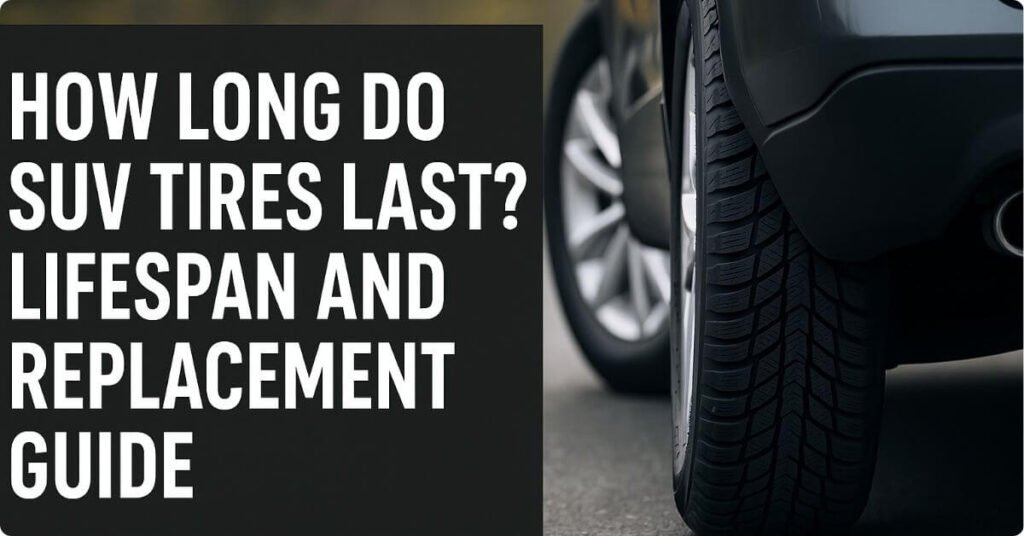
When it comes to maintaining your SUV, one of the most important things to keep an eye on is the condition of your tires. They’re the only contact your vehicle has with the road, and their lifespan can significantly affect your safety and driving experience. So, how long do SUV tires last, and when should you replace them? Let’s dive into the details!
How Long Do SUV Tires Last?
The lifespan of SUV tires can vary based on several factors, including tire quality, driving conditions, and maintenance. On average, you can expect your SUV tires to last anywhere between 40,000 to 60,000 miles (64,000 to 96,000 kilometers). However, this can be influenced by how you drive, the type of tire, and even the climate in your area. Let’s take a closer look at what influences tire longevity.
Factors That Affect Tire Lifespan
Driving Habits
Your driving style plays a huge role in how long your SUV tires will last. For example, frequent hard braking, rapid acceleration, and sharp turns can wear down the rubber more quickly. On the other hand, smooth driving with gradual stops and steady acceleration can help extend the life of your tires.
Road Conditions
The type of roads you drive on also affects tire wear. If you frequently drive on rough, uneven roads or gravel, your tires will experience more stress and wear out faster. Paved highways and city roads tend to be gentler on tires.
Climate and Weather
Harsh temperatures, both high and low, can accelerate the degradation of the rubber in your tires. For example, tires in very hot climates may degrade due to the constant exposure to high temperatures, while colder climates can cause the rubber to become brittle and crack. If you reside in a region with fluctuating weather conditions, you might need to replace your tires sooner than expected.
Tire Maintenance
Consistent upkeep can greatly extend the longevity of your tires. Proper inflation is one of the most important factors. Underinflated tires wear out faster and can affect your fuel efficiency, while overinflated tires can lead to blowouts. Regular tire rotations, balancing, and alignments also ensure that your tires wear evenly, which helps them last longer.
Tire Quality
The brand and quality of the tire you choose will also influence its lifespan. High-quality tires from trusted manufacturers tend to last longer and perform better compared to cheaper, lower-quality options. When selecting tires for your SUV, it’s worth investing in good-quality ones that are suited to your vehicle and driving conditions.
How Long Should SUV Tires Last?
Ideally, you want your SUV tires to last as long as possible, but there are some important maintenance practices to ensure that happens. Regular tire maintenance, such as rotating them every 6,000 to 8,000 miles (about 10,000 to 12,000 kilometers), balancing, and checking tire pressure, will help extend their life. Additionally, if you have a high-quality tire brand, you might expect a longer lifespan compared to cheaper, less durable options.
Most tire manufacturers suggest replacing your tires after 6 years of use, even if they don’t show visible signs of damage. After 10 years, regardless of the tread depth or wear, it’s generally recommended to replace your tires. This is because the rubber compound in the tire can deteriorate over time, especially when exposed to extreme temperatures, even if the tire hasn’t been used much.
How Many Miles Do SUV Tires Last?
As mentioned, the average lifespan of SUV tires is typically between 40,000 and 60,000 miles. However, some high-quality tires designed for SUVs may last up to 80,000 miles or more. It’s important to keep in mind that driving habits play a significant role. If you tend to drive aggressively, take sharp turns, or have a lot of stop-and-go driving, you may need to replace your tires sooner.
How Many Kilometers Do SUV Tires Last?
For those who use kilometers instead of miles, SUV tires generally last between 64,000 km and 96,000 km on average. High-end tires or those made from durable materials may go beyond that range, but remember, how well you maintain your tires and your driving habits will always impact how long they last.
What is the Average Mileage on SUV Tires?
The average mileage on SUV tires depends on the type of tires you choose, but most standard SUV tires will give you about 50,000 miles (80,000 kilometers) of use before they need to be replaced. However, it’s important to note that this is just a general guideline, and individual tire performance can vary based on many factors.
For example, tires made for off-roading may wear faster than those designed for highway driving. Similarly, tires designed for specific climates (like all-season tires) will wear differently than those intended for winter conditions.
How Often Should You Replace SUV Tires?
Now, the big question: how often should you replace SUV tires? The general rule of thumb is to replace your SUV tires every 6 years, with a maximum lifespan of 10 years, regardless of the mileage. This is due to the natural breakdown of the rubber and other materials over time, even if the tires look fine.
However, the actual time frame for replacement depends on how much you drive and how well you maintain your tires. For example, if you drive a lot on rough roads or in harsh weather conditions, you might need to replace them more frequently.

When to Replace SUV Tires?
Knowing when to replace SUV tires is crucial for safety. Even if your tires still have plenty of tread, they may be too old to perform optimally. Here are some signs that it’s time to replace your SUV tires:
Tread Wear
The tread on your tires is crucial for traction, especially in wet or slippery conditions. As the tread wears down, your tires become less effective at gripping the road, increasing the risk of hydroplaning and loss of control. Most tires have built-in tread wear indicators, small bars that show up when the tread gets too low. If the tread on your tires is worn down to these indicators, it’s time to replace them.
Cracks and Bulges
Cracks in the sidewall or a bulging tire are a serious warning sign. These defects can weaken the structural integrity of the tire, making it more prone to blowouts. If you notice any visible cracks, bulges, or bubbles on your tires, get them checked out immediately by a professional.
Vibration or Noise
A noticeable vibration or unusual noise while driving can be a sign of tire damage or misalignment. If your tires are balanced properly and inflated correctly, they should run smoothly and quietly. Vibrations or noises could indicate an issue with your tires, like uneven wear or internal damage, which may require replacement.
Age of the Tire
Even if your tires look fine, they have a shelf life. Tire manufacturers recommend replacing your tires every six years, and definitely no later than ten years, regardless of the tread condition. Over time, the rubber in tires can dry out and lose its elasticity, making them less safe to drive on. So, even if your tires have plenty of tread left, it’s a good idea to replace them after ten years.
How Often Do SUVs Need New Tires?
The frequency of tire replacement largely depends on the type of driving you do. If you primarily drive on highways and smooth roads, your tires may last longer compared to someone who frequently drives on rough terrain or in extreme weather conditions. On average, SUVs need new tires every 3 to 5 years if you drive regularly. However, it’s important to check your tires’ condition regularly to catch signs of wear early.
How Often to Replace Tires on SUV?
As a general guideline, you should replace tires on your SUV every 6 years, with a maximum of 10 years, regardless of mileage. That said, if your SUV is exposed to harsh conditions, such as frequent off-roading or extreme climates, you may need to replace the tires more frequently.
When to Change SUV Tires?
Knowing when to change SUV tires is crucial for your safety. As mentioned, look for signs like low tread depth, sidewall damage, or unusual vibrations. If your tires have reached the end of their lifespan or show signs of wear, don’t delay replacing them. Driving on old or worn-out tires can reduce traction, increase stopping distances, and even cause accidents.

How to Maximize the Lifespan of Your SUV Tires
Now that you know the factors that affect tire longevity and the signs that it’s time for a replacement, let’s go over some tips to help you extend the life of your SUV tires and get the most out of your investment.
Check Tire Pressure Regularly
Keeping your tires properly inflated is one of the simplest and most effective ways to extend their life. Make sure to inspect your tire pressure at least once a month and prior to embarking on any long trips. Follow the manufacturer’s recommended pressure (usually found on a sticker inside your driver’s side door) to ensure optimal performance.
Rotate Your Tires
Tire rotation is the process of changing the position of your tires on the vehicle to promote even wear. It is generally recommended to perform this task every 6,000 to 8,000 miles, or according to the guidelines provided in your vehicle’s owner’s manual. This helps ensure that no single tire wears out prematurely, extending their overall lifespan.
Get Regular Alignments
Misalignment can cause uneven tire wear, leading to the need for replacement sooner than expected. If you notice your steering wheel pulling to one side or your vehicle drifting, it may be a sign that your alignment is off. Having your alignment checked regularly can prevent premature wear and tear on your tires.
Balance Your Tires
Unbalanced tires can cause vibrations, uneven wear, and even strain on your suspension system. Make sure to have your tires balanced regularly, especially after installing new ones or rotating them.
Drive Carefully
While it might be tempting to speed up or make sharp turns, especially in your SUV, this can put unnecessary strain on your tires and cause them to wear out faster. Try to drive smoothly and avoid sudden stops, starts, or sharp corners to preserve your tires.
Conclusion
The lifespan of your SUV tires depends on factors like tire quality, driving habits, and maintenance. On average, you can expect your SUV tires to last between 40,000 and 60,000 miles (64,000 to 96,000 km), but some premium models may last even longer. Regardless, regular tire inspections and proper maintenance are key to ensuring your tires last as long as possible.
By staying on top of your tire’s health and knowing when to replace SUV tires, you can keep your vehicle in top condition and ensure your safety on the road. Don’t forget to consider other important factors, like rotating your tires regularly and checking the alignment, to maximize their lifespan.
Drive safely!


